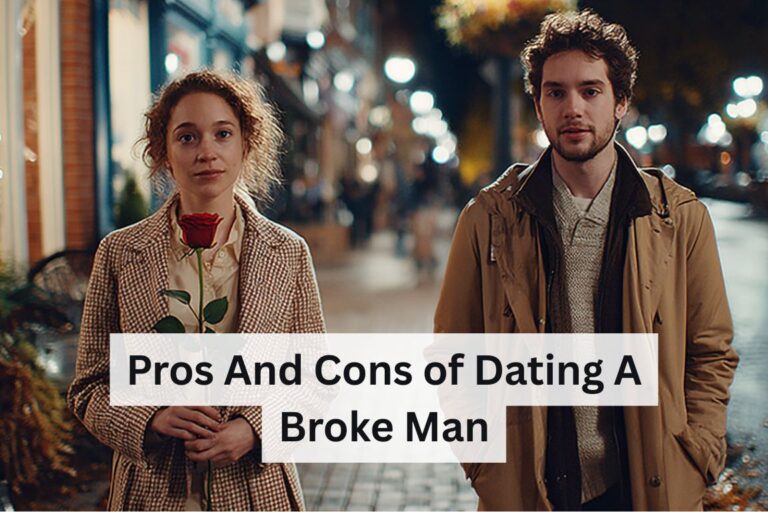When it comes to matters of the heart, financial status shouldn’t be the only deciding factor, right?
Yet here you are, weighing whether that charming guy who makes you laugh until your sides hurt is worth pursuing, even though his bank account might tell a different story.
The reality is that navigating romance when money is tight presents unique challenges and unexpected benefits that deserve honest discussion.
This isn’t about being shallow or materialistic. It’s about making informed choices that align with your values, goals, and life circumstances.
What Does “Financially Challenged” Actually Mean?
Before diving into the complexities, let’s clarify what we’re really talking about. Being financially challenged isn’t a one-size-fits-all situation.
For some, it means living paycheck to paycheck with little room for luxuries. For others, it might involve recovering from a major financial setback, navigating student debt, or pursuing a passion-driven career that doesn’t pay well yet.
Consider these scenarios: a graduate student focused on his PhD, an artist building his portfolio, someone rebuilding after a divorce, or perhaps a person who’s simply made poor financial decisions but shows signs of growth.
The key distinction lies in whether this is a temporary season or a permanent mindset.
Financial struggles aren’t always permanent. Many successful people have experienced what we might call “ramen noodle years“, those lean periods that eventually lead to greater stability and success.

Unexpected Benefits
1. Creativity Becomes Currency
When expensive gifts and lavish dates aren’t options, something wonderful often happens: creativity flourishes. Men who can’t rely on their wallets often become masters of thoughtful gestures.
Think home-cooked dinners with candlelight, surprise picnics in scenic spots, handwritten letters, or weekend adventures that cost nothing but create lasting memories.
These experiences often carry more emotional weight than anything purchased from a high-end store.
There’s something deeply romantic about someone who puts genuine thought and effort into making you smile, even when resources are limited.
2. Building Your Own Financial Independence
Dating someone who can’t financially support you forces you to develop and maintain your own financial security.
This isn’t necessarily a drawback. It’s potentially empowering. You learn to stand on your own feet, make your own money moves, and never depend entirely on another person for your lifestyle.
This independence can be liberating. You maintain control over your financial decisions, career choices, and life direction. Should the relationship end, you’re not left scrambling to figure out how to support yourself.
3. Less Material Pressure, More Authentic Connection
Without the pressure to “keep up” with expensive expectations, relationships can become refreshingly grounded.
There’s less focus on status symbols and more emphasis on genuine compatibility, shared values, and emotional connection.
Many couples find that financial limitations actually bring them closer together. They learn to be resourceful as a team, support each other through challenges, and find joy in simple pleasures that money can’t buy.
4. Motivation and Growth Potential
Some of the most driven, ambitious people are those who are currently “between financial success stories.”
A partner who’s working hard to improve his situation might be more motivated, focused, and appreciative than someone who’s always had financial comfort.
If he’s genuinely working toward better financial stability, you might be getting in on the ground floor of someone’s success story. The question is whether you’re willing to take that gamble.
Significant Disadvantages
1. Financial Stress Affects Everything
Money problems don’t stay contained to bank statements. They seep into every aspect of daily life.
Financial stress can create tension, anxiety, and conflict even between couples who genuinely love each other.
When bills are overdue or unexpected expenses arise, even the strongest relationships can feel the strain.
This stress often manifests in unexpected ways: short tempers, mood swings, depression, or avoidance of important conversations.
The person you fell for might seem different under financial pressure.
2. Limited Lifestyle Options
Dating someone with financial constraints means adjusting your expectations and sometimes your desires.
Spontaneous weekend getaways, nice dinners out, concerts, or even simple activities like movies might become rare luxuries rather than regular enjoyments.
If you’re someone who values experiences, travel, or social activities that cost money, you might find yourself frequently disappointed or constantly compromising.
Over time, this can lead to resentment or feeling like you’re missing out on life.

3. The “Caretaker” Dynamic Risk
There’s a fine line between being supportive and becoming a financial caretaker.
You might find yourself gradually picking up more expenses: groceries, utilities, entertainment, and eventually major costs.
What starts as occasional generosity can evolve into an unspoken expectation.
This dynamic can breed resentment on both sides. You might feel taken advantage of, while he might feel emasculated or guilty. Neither position is healthy for a balanced relationship.
4. Potential for Insecurity and Jealousy
Financial disparity can trigger insecurity in both partners. He might feel inadequate or threatened by your financial stability, leading to jealousy, defensiveness, or attempts to control spending.
You might question whether his affection is genuine or motivated by what you can provide.
These insecurities can poison even the most loving relationships, creating doubt and suspicion where trust should flourish.
Timing Matters More Than You Think
Your age significantly impacts how wise it is to take this romantic gamble. Time becomes a crucial consideration, especially for women who want children or are looking for long-term stability.
1. The Under-30 Advantage
If you’re in your twenties, you have something invaluable: time. You can afford to take chances, see how situations develop, and recover if things don’t work out.
A partner’s current financial status matters less when both of you have decades ahead to grow and improve.
Young relationships often involve both people figuring out their careers, goals, and financial paths together. There’s something beautiful about building success as a team from the ground up.
2. The Over-30 Reality
Once you hit your thirties, the calculation changes dramatically. You might be thinking about home ownership, starting a family, or achieving certain life goals by specific ages.
Time becomes more precious, and the opportunity cost of “waiting to see” becomes more significant.
If you’re looking for stability, security, and someone ready to move forward with major life decisions, a financially struggling partner might not align with your timeline, regardless of how wonderful he is in other areas.
Red Flags vs. Yellow Flags
Not all financial struggles are created equal. Learning to distinguish between temporary setbacks and problematic patterns is crucial.
Major Red Flags (Run, Don’t Walk)
- Refusing to work or actively avoiding employment
- Spending money irresponsibly on unnecessary items while claiming to be “broke”
- Expecting you to support his lifestyle without contributing
- Lying about his financial situation or hiding debts
- Blaming everyone else for his financial problems
- No plan or apparent desire to improve his situation
Yellow Flags (Proceed with Caution)
- Recently experienced a major financial setback (job loss, medical bills, divorce)
- Working hard but in a low-paying field or building a business
- Has debt but is actively working to pay it off
- Honest about his situation and motivated to improve
- Contributes in non-financial ways (housework, emotional support, time)
Questions to Ask Yourself
Before deciding whether to pursue or continue a relationship with someone facing financial challenges, honestly answer these questions:
About Him:
- Is he actively working to improve his situation, or is he content with the status quo?
- Does he take responsibility for his financial problems, or does he blame external factors?
- How does he handle stress, and does financial pressure bring out his best or worst qualities?
- Are his financial struggles due to circumstances, poor choices, or lack of effort?
About You:
- Can you handle the stress of financial uncertainty in a relationship?
- Are you looking for someone to support you financially, or are you financially independent?
- How important are expensive experiences, gifts, or lifestyle elements to your happiness?
- Do you have the emotional and financial capacity to potentially support another person?
About Your Future:
- Are your life goals achievable with a financially struggling partner?
- How much time are you willing to invest in “potential” rather than current reality?
- What happens if his financial situation never improves?

If You Decide to Move Forward
Should you choose to date someone with financial limitations, protecting both your heart and your wallet becomes essential.
1. Establish Clear Boundaries Early
Have honest conversations about money expectations. Who pays for what? How are shared expenses handled? What are you comfortable contributing, and what should he handle? Setting boundaries early prevents resentment later.
Don’t assume he’ll “figure it out” or that love will solve practical problems. Be explicit about your expectations and limits.
2. Support Growth, Not Dependency
Encourage his efforts to improve his situation without becoming his financial lifeline. You can offer emotional support, advice, or connections, but avoid solving his problems for him.
Help him develop skills rather than just providing money. This might mean encouraging him to take courses, apply for better jobs, or develop side income streams.
3. Maintain Your Own Financial Health
Never compromise your own financial stability for someone else’s comfort. Continue building your savings, pursuing your career goals, and making smart money decisions.
If supporting him starts affecting your ability to pay your own bills, save money, or achieve your goals, it’s time to reassess the situation.
4. Plan Creative, Low-Cost Experiences
Embrace the opportunity to be inventive with dates and quality time. Cooking together, hiking, free community events, museum free days, or picnics can be more intimate and memorable than expensive alternatives.
Creativity in dating can actually strengthen your connection and create unique shared experiences that money can’t buy.
When Love Isn’t Enough
Sometimes, despite genuine feelings and good intentions, financial incompatibility becomes insurmountable.
Recognizing when to step back isn’t giving up on love. It’s honoring your own needs and future.
Consider ending things if:
- Financial stress is consistently affecting your mental health or overall happiness
- You’re repeatedly compromising your own financial security
- He shows no genuine effort to improve his situation
- You find yourself constantly disappointed or frustrated
- The relationship feels more like charity than partnership
- Your life goals are becoming impossible to achieve within this dynamic
Remember: choosing to end a relationship due to financial incompatibility doesn’t make you shallow or materialistic. It makes you realistic about what you need to build the life you want.
It’s About Compatibility, Not Just Cash
Dating someone with financial challenges isn’t inherently good or bad. It depends entirely on your individual circumstances, values, and goals.
Some couples thrive when building success together from the ground up. Others find that financial stress undermines even the strongest emotional connection.
The key is being brutally honest with yourself about what you can handle, what you need, and what you’re willing to sacrifice or risk.
Money isn’t everything, but financial compatibility affects nearly everything in a long-term relationship.
Whether you decide to take the chance or step back, make your choice based on a clear understanding of both the potential rewards and the very real risks involved.
Your future self will thank you for thinking with both your heart and your head.
Remember: you deserve a relationship where you feel supported, respected, and confident about your shared future, regardless of what that looks like financially.


